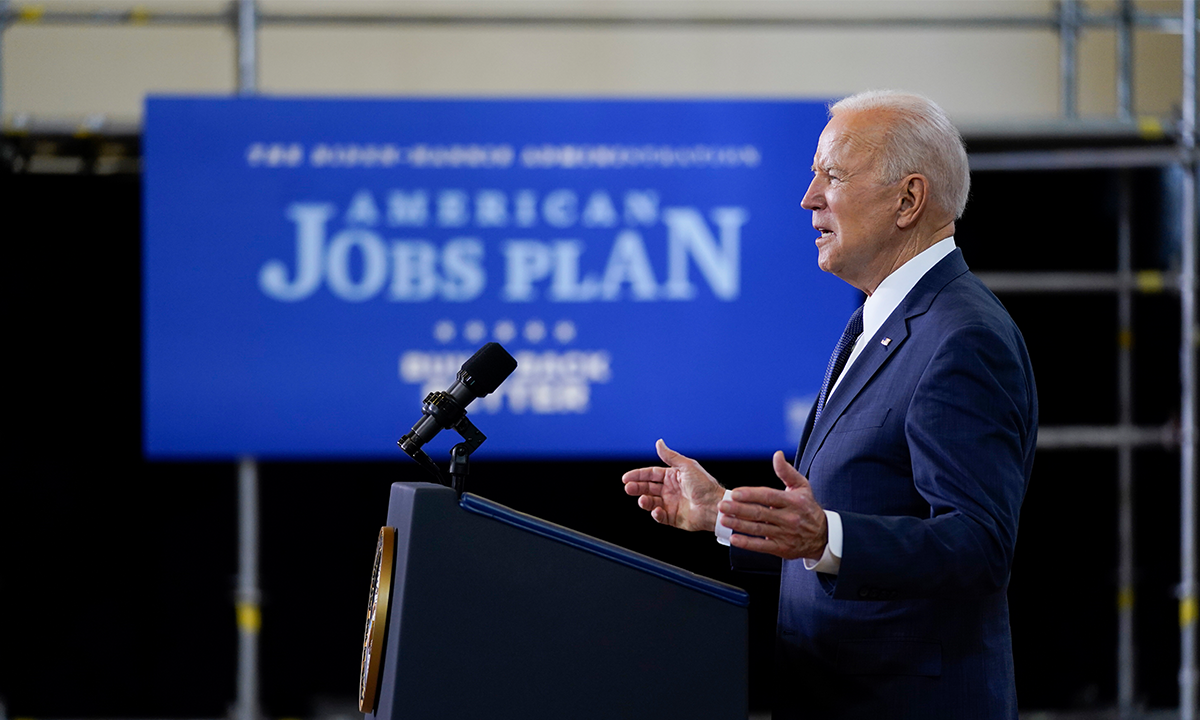
US President Joe Biden delivers a speech on a $2 trillion infrastructure spending at Carpenters Pittsburgh Training Center on Wednesday in Pittsburgh. Photo: VCG
As the US government unveils a $2 trillion infrastructure plan, President Joe Biden said that the US must put itself "in a position to win the global competition with China." At a press briefing on Sunday, a White House spokesperson again stressed the importance of competing with China, saying it had support from both parties and the American people.
Since the Obama era, outdated infrastructure has become an issue with consensus among the US public and political parties. But restarting construction has hardly seen any substantial progress. For instance, California's high-speed rail has been discussed for more than a decade but it remains on paper. Airport terminals are also small and old. Biden has described the LaGuardia Airport as an airport that looks like something in "some third-world country."
"It's a once-in-a generation investment in America," said Biden of the infrastructure plan. It's rational for a new US administration to focus on infrastructure and try to revive the economy and boost employment at the beginning of its term; however, sadly, it just could not leave China out of their internal discussions.
Trump immediately opposed the plan, saying that it was a "giveaway to China" and the proposed tax increases designed to fund the $2 trillion proposal would end up backfiring by sending American jobs overseas.
It is becoming a perpetual mindset among US politicians to use China as a catch-all guise, whether they're proposing or opposing something.
Biden's plan would raise the corporate tax rate to 28 percent from 21 percent, returning to the level in the Obama era. But tax cut is the most important legacy of Trump's presidency. And behind Trump are a large number of people and interest groups that are deeply resistant to taxes and government intervention in the economy.
Pittsburgh was an elaborative choice for Biden to launch the mega infrastructure plan. Once known as the "world's steelmaking capital", Pittsburgh used to contribute 40 percent of US steel output. As manufacturing moved out of the country, most cities in the Great Lakes, such as Motor City Detroit, fell into decline. Large numbers of high-paying, decent manufacturing jobs have been lost, and a large number of white blue-collar workers who used to be middle class have suffered economically and socially.
However, Pittsburgh is different. After decades of efforts, it has transformed into a new city with thriving industries of technology, biology, and culture. During the transformation, it didn't abandon manufacturing, but led a path with government supporting smaller, more technologically advanced companies. Behind the success are local government's comprehensive planning and long-term implementation, as well as sound communication and compromise among the ruling Democratic Party and big enterprises and mostly Republican rich families.
Historically speaking, it seems the only way for the US government to make costly public investments was to create an adversary that is presumed to threaten its security. In the 1950s and 1960s, when the US built interstate highways and launched the space program, it chose the Soviet Union as its "perfect enemy."
If there's no such enemy, make one. China appears to have become an ideal candidate in the eyes of Washington.
However, making up imaginary enemies, from another perspective, has forecasted the futile outcome of Biden's plan, just like those of his two predecessors. Even the most anti-China politicians and media outlets know clearly that China is not the Soviet Union and not an enemy that poses threats to the security of the US, but a strong competitor economically.
The logic of using competition with China as a reason to increase taxes to enhance infrastructure is as farfetched as a student asking for a sports car so he/she can get better grades. Rebuilding old infrastructure is not a job with high profitability and high participation of private sector. It can only dependent on public spending, which is hard to get support. Therefore, the US' failure in promoting infrastructure plans, to some extent, may be inevitable historically and is not about its determination.
The article was compiled based on a commentary written by Liu Ge, a senior research fellow of Chongyang Institute for Financial Studies, Renmin University of China. bizopinion@globaltimes.com.cn




